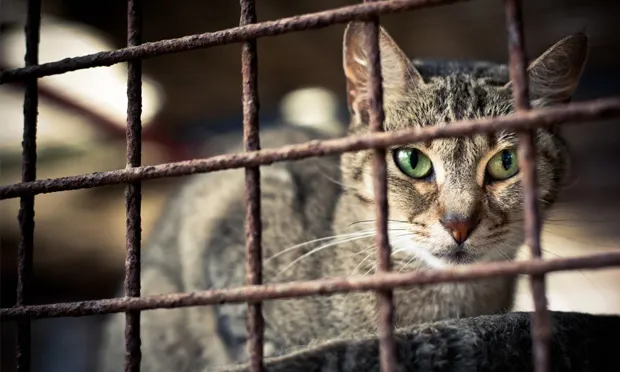Rabies in the Clinic

Each year in the U.S., several thousand cases of rabies are diagnosed in wildlife, particularly among reservoir species (eg, raccoons, skunks, foxes, bats), and several hundred cases are diagnosed in domestic animals. Cats account for nearly 50% of domestic animal cases.1 In countries where canine rabies has been controlled but wildlife rabies remains, cats are often a greater source of rabies exposure to humans than are dogs2 and are considered highly susceptible to infection and highly capable of transmission.3,4 There is some debate as to whether cats are more susceptible to rabies than dogs, and results appear to be dependent on the challenge virus used in experimental studies.2 Cats also appear more susceptible to wildlife isolates but less susceptible to canine isolates.2 Specific feline rabies strains have not been documented, and intraspecific transmission among cats appears limited.3
Incubation & Age
The site of rabies inoculation affects incubation time; the farther from the brain, the longer the incubation time.
In dogs, the average incubation period is 3–8 weeks (range, several days to >6 months).3
In cats, the average incubation period is 4–6 weeks.5
Dogs and cats as young as 8 weeks of age have been documented with rabies,6,7 and it is likely that younger animals can be at risk.
Signs & Shedding
Clinical signs of rabies can be highly variable, but behavior changes are usually seen first.
Patients shed virus in the saliva a few days before clinical signs develop.
Once signs develop, progression to death is rapid.
Prodromal stage (1–3 days’ duration):
Dogs: Lick site of inoculation; seek solitude; are more anxious/docile/apprehensive/irritable; develop fever, lethargy, snapping
Cats: Similar to dogs, but behavior may be more erratic
Furious stage, or the classic “mad dog” stage (1–7 days’ duration):
Dogs: May experience restlessness, irritability, enhanced response to auditory and visual stimuli, changes in bark, choking sounds, drooling, ataxia, seizures, coma; are excitable and aggressive; behavior includes snarling, biting, barking, or snapping at imaginary objects; attempt to eat inanimate objects
May lead to death
Signs are similar for (and more common in) cats, who may become exceedingly vicious and strike out suddenly
Paralytic stage (1–10 days’ duration):
Typically follows furious stage
More common in dogs than in cats
Signs include paralysis (causing jaw to stay open), apparent difficulty swallowing, saliva dripping from mouth, ataxia, paralysis, coma, respiratory failure
May lead to death
|
A bite by a suspected or confirmed rabid animal
Contact with saliva or nervous tissue and/or fluids from a suspected or confirmed rabid animal to compromised skin or mucous membranes (eg, eyes, mouth)
A scratch from a suspected or confirmed rabid animal, where contamination of the wound with saliva is a risk
Contact with a bat or being asleep or unconscious in the same room as a bat (because the human cannot say for certain they did not have contact with the bat).8,9
Bat encounters and bat strains of rabies account for nearly all of the indigenous human cases of rabies in the U.S.,1 many of which do not report bat exposures before death.
Globally, bat-acquired cases of rabies are more likely to be misdiagnosed and lack a bite history than dog-acquired cases.10 Human deaths from other bat-associated lyssaviruses have occurred in South Africa, Nigeria, Kenya, Ukraine, Russia, Scotland, Finland, the UK, and Australia.11,12
The U.S. Centers for Disease Control and Prevention recommend post-exposure prophylaxis (PEP) for suspected and/or confirmed bat encounters, although some countries and states do not.9
|
Blood, vomitus, feces, urine, and fomites are not sources for rabies transmission
A scratch from an animal not suspected or confirmed to have rabies
|
Actions & Quarantine
Immediately wash wounds with soap and water for 15 minutes.
Apply first aid to bite wounds.
For a canine or feline patient bitten by a rabid animal or a rabies reservoir species:
If unvaccinated, the patient should be euthanized.
If the owner declines, the patient should be placed in 6-month quarantine and vaccinated against rabies at the start of the quarantine or one month before release.
An up-to-date, vaccinated patient should be revaccinated immediately and placed in 45-day quarantine.
Patients previously vaccinated but past-due for boosters should be considered on a case-by-case basis while keeping in mind the local or state laws regarding such cases. In some states, an animal even one day past-due for a rabies booster would be considered unvaccinated.
Other considerations include: severity of exposure, time elapsed since last rabies vaccination, number of rabies vaccinations during the patient’s life, current health status, and local rabies epidemiology.13
For a human bitten by a pet:
Any dog, cat, or ferret that bites a human, regardless of the pet’s vaccination status, requires 10-day quarantine.
An animal shedding rabies virus at the time of the bite will demonstrate signs of rabies within 10 days.
If the animal demonstrates signs of rabies during the 10 days, the animal should be euthanized and the head submitted for testing.
The location of the quarantine depends on local laws and circumstances. Consult the state health department and local animal control agency.
Protecting Staff
All veterinary practice team members working with animals should be vaccinated against rabies.
Pre-exposure vaccination protects against unnoticed exposures and is much less costly than post-exposure prophylaxis for unvaccinated persons.